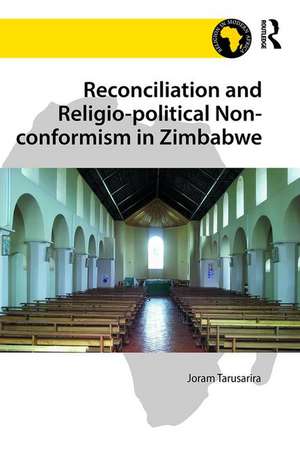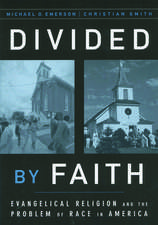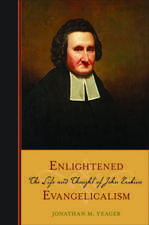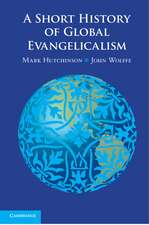Reconciliation and Religio-political Non-conformism in Zimbabwe: Religion in Modern Africa
Autor Joram Tarusariraen Limba Engleză Hardback – 19 mai 2016
| Toate formatele și edițiile | Preț | Express |
|---|---|---|
| Paperback (1) | 260.93 lei 6-8 săpt. | |
| Taylor & Francis – 12 dec 2019 | 260.93 lei 6-8 săpt. | |
| Hardback (1) | 820.32 lei 6-8 săpt. | |
| Taylor & Francis – 19 mai 2016 | 820.32 lei 6-8 săpt. |
Preț: 820.32 lei
Preț vechi: 1103.01 lei
-26% Nou
Puncte Express: 1230
Preț estimativ în valută:
157.00€ • 163.28$ • 131.38£
157.00€ • 163.28$ • 131.38£
Carte tipărită la comandă
Livrare economică 15-29 martie
Preluare comenzi: 021 569.72.76
Specificații
ISBN-13: 9781472465993
ISBN-10: 1472465997
Pagini: 254
Ilustrații: Includes 4 b&w illustrations
Dimensiuni: 156 x 234 x 23 mm
Greutate: 0.48 kg
Ediția:New ed.
Editura: Taylor & Francis
Colecția Routledge
Seria Religion in Modern Africa
Locul publicării:Oxford, United Kingdom
ISBN-10: 1472465997
Pagini: 254
Ilustrații: Includes 4 b&w illustrations
Dimensiuni: 156 x 234 x 23 mm
Greutate: 0.48 kg
Ediția:New ed.
Editura: Taylor & Francis
Colecția Routledge
Seria Religion in Modern Africa
Locul publicării:Oxford, United Kingdom
Cuprins
1 Religion, Society and Politics in Zimbabwe
2 Secularisation, Sacralisation and Civil Society in Zimbabwe
3 Democratisation, Reconciliation and Civil Society
4 Understanding Religious Non-Conformism
5 Historical Perspectives on Religio-Political Non-Conformism in Zimbabwe: From Colonial Rule to 1999
6 Religio-Political Non-Conformism in Zimbabwe since 2000 to 2013
7 Prospects for Religio-Political Non-Conformism in Zimbabwe - Contributions to Debates on Democratisation and Reconciliation
8 The Prospects for Religio-political Non-Conformism in Zimbabwe – Maximizing Effective Action
9 Conclusion
2 Secularisation, Sacralisation and Civil Society in Zimbabwe
3 Democratisation, Reconciliation and Civil Society
4 Understanding Religious Non-Conformism
5 Historical Perspectives on Religio-Political Non-Conformism in Zimbabwe: From Colonial Rule to 1999
6 Religio-Political Non-Conformism in Zimbabwe since 2000 to 2013
7 Prospects for Religio-Political Non-Conformism in Zimbabwe - Contributions to Debates on Democratisation and Reconciliation
8 The Prospects for Religio-political Non-Conformism in Zimbabwe – Maximizing Effective Action
9 Conclusion
Notă biografică
Joram Tarusarira attained his PhD from the Institute for African Studies at the University of Leipzig (Germany), where he was a German Research Foundation doctoral candidate of the Research Training Group, "Religious Non-Conformism and Cultural Dynamics". His research interests, in which he has published journal articles and book chapters, include the role of religion in conflict and its transformation, religious non-conformism and cultural dynamics, religion and civil society, social movements, post-conflict reconciliation. His academic background is in the following disciplines: philosophy and religious studies, adult education and development studies, conflict resolution and post-conflict reconciliation studies. His academic experience has been enriched by studying in various countries: Zimbabwe, Canada, Ireland/ Northern Ireland and Germany.
Recenzii
"This is a rich, informative and well researched book which contributes significantly to studies on churches in Zimbabwe." - Ezra Chitando, University of Zimbabwe, Zimbabwe
"Joram Tarusarira has written a fascinating study, exploring the relationship between religion, society and politics in Zimbabwe. His account explains how religion is contributing to democratisation and reconciliation in the country, often written off as a basket case beyond redemption. Tarusarira shows that the often subtle interplay between religious and secular political actors can contribute to post-conflict rebuilding in Zimbabwe and hopefully to help heal the wounds of the past. I thoroughly recommend the book for anyone interested in the intricacies of the relationship between politics and religion in Africa." - Jeffrey Haynes, London Metropolitan University, UK
"Joram Tarusarira offers a thorough, up-to-date and compelling analysis of the role of religion in contemporary Zimbabwe. Pushing beyond studies that focus on Zimbabwe's mainline churches, Tarusarira draws on excellent fieldwork to analyse the religio-political organisations that are working on the ground to promote reconciliation. His development of the concept of religious non-conformism, which explains how such organisations are well-equipped to spark change, is a valuable contribution to the social scientific study of religion. This book deserves a wide readership among those interested in the relationships between religion, politics, reconciliation and social change." - Gladys Ganiel, Queen's University Belfast, UK
"Joram Tarusarira has written a fascinating study, exploring the relationship between religion, society and politics in Zimbabwe. His account explains how religion is contributing to democratisation and reconciliation in the country, often written off as a basket case beyond redemption. Tarusarira shows that the often subtle interplay between religious and secular political actors can contribute to post-conflict rebuilding in Zimbabwe and hopefully to help heal the wounds of the past. I thoroughly recommend the book for anyone interested in the intricacies of the relationship between politics and religion in Africa." - Jeffrey Haynes, London Metropolitan University, UK
"Joram Tarusarira offers a thorough, up-to-date and compelling analysis of the role of religion in contemporary Zimbabwe. Pushing beyond studies that focus on Zimbabwe's mainline churches, Tarusarira draws on excellent fieldwork to analyse the religio-political organisations that are working on the ground to promote reconciliation. His development of the concept of religious non-conformism, which explains how such organisations are well-equipped to spark change, is a valuable contribution to the social scientific study of religion. This book deserves a wide readership among those interested in the relationships between religion, politics, reconciliation and social change." - Gladys Ganiel, Queen's University Belfast, UK
Descriere
This book critically analyses the role of religio-political organisations in advocating democratisation and reconciliation in Zimbabwe against acquiescent, silenced or co-opted mainstream churches. Tarusarira analyses activities of religious organisations that deviate from the mainline churches’ and the political elite's position with regard to religious participation in political matters, against a background of political conflict and violence. The author draws on detailed case studies of three such groups: the Zimbabwe Christian Alliance (ZCA), Churches in Manicaland (CiM) and Grace to Heal (GtH). Special attention is paid to religio-political non-conformists and their civil society allies offering alternative sources for promoting democratisation and reconciliation.




















